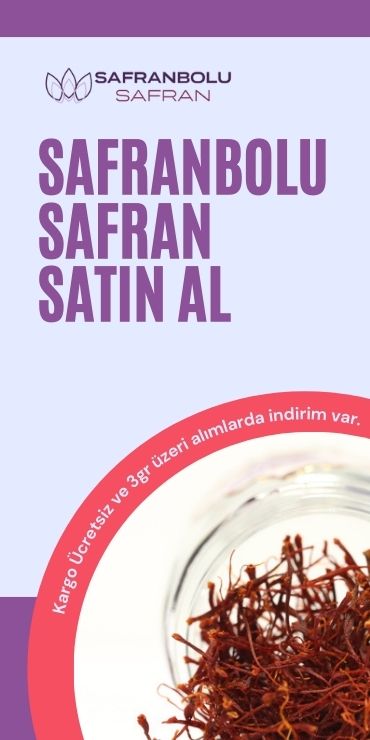
Antioksidan Etki
Safran, krosin, krosetin, safranal ve kaempferol gibi antioksidan görevi gören bitki bileşikleri
bakımından zengindir. Antioksidanlar, hücrelerinizi oksidatif strese karşı korumaya yardımcı
olur.
Krosin ve krosetin, karotenoid pigmentlerdir ve safranın kırmızı renginden sorumludur. Her
iki bileşik de antidepresan özelliklere sahip olmakla birlikte, beyin hücrelerini ilerleyici hasara
karşı koruyabilir, iltihabı iyileştirebilir, iştahı azaltabilir ve kilo kaybına yardımcı olabilir.
Kaempferol, meyve ve sebzelerde bulunan bir polifenol antioksidandır. Birçok çalışma,
diyetteki kaempferolün kronik hastalıklardaki ve özellikle kanser riskini azaltmadaki yararlı
etkilerini tanımlamıştır. Epidemiyolojik çalışmalar, kaempferol alımı ile kanser arasında ters
bir ilişki olduğunu göstermiştir. Kaempferol, vücudun kanser gelişimini destekleyen serbest
radikallere karşı antioksidan savunmasını artırarak yardımcı olur. Moleküler düzeyde,
kaempferolün apoptoz (programlı hücre ölümü), anjiyogenez (yeni damar oluşumu),
inflamasyon ve metastaz ile bağlantılı hücresel sinyal iletim yollarında bir dizi anahtar unsuru
modüle ettiği bildirilmiştir. Önemli bir şekilde, kaempferol, kanser hücresi büyümesini ve
anjiyogenezi inhibe eder ve kanser hücresi apoptozunu indükler, diğer yandan kaempferol
bazı durumlarda koruyucu bir etki uygulayarak normal hücre canlılığını korur.
Son yıllarda yapılan başka bir çalışmada 72.5 ve 145 mg/kg dozlarda safranal intraperitonal
olarak sıçanlara uygulanmış, toplam sülfid- ril içeriği ve antioksidan kapasite
şeklinde oksidatif stres belirteçleri değerlendirilmiştir. Safranal uygula- mayı takiben total
sülfidril içeriği ve antioksidan ka-pasite, anlamlı olarak dozla beraber artmış, nörolojik skorda
belirgin azalmalar gözlenmiştir. Bu çalışmada, safranalın serbest radikallerin üretimini
baskılayarak ve antioksidan aktiviteyi arttırarak iskemik reperfüz- yon hasarı üzerinde
koruyucu etkisi olduğu sonucuna da varılmıştır (Sadeghnia ve ark., 2017).
Reklam
Gerçek Safranbolu Safranı'nı Nasıl Alabilirim?
Referanslar
1-Therapeutic Benefits of Saffron in Brain Diseases: New Lights on Possible
Pharmacological Mechanisms
https://www.sciencedirect.com/science/article/pii/B9780128184622000103
2-Saffron and crocin improved appetite, dietary intakes and body composition in patients
with coronary artery disease
https://pubmed.ncbi.nlm.nih.gov/29391933/
3-A review of the dietary flavonoid, kaempferol on human health and cancer
chemoprevention
https://pubmed.ncbi.nlm.nih.gov/23497863/
4-Saffron (Crocus sativus L.) and major depressive disorder: a meta-analysis of randomized
clinical trials
https://pubmed.ncbi.nlm.nih.gov/24299602/
5-Crocus sativus L. (petal) in the treatment of mild-to-moderate depression: a double-blind,
randomized and placebo-controlled trial
https://pubmed.ncbi.nlm.nih.gov/16979327/
6-Chronic inflammation and oxidative stress as a major cause of age-related diseases and
cancer
https://pubmed.ncbi.nlm.nih.gov/19149749/
7-https://www.drugs.com/npp/saffron.html
8-Crocin from Crocus sativus possesses significant anti-proliferation effects on human
colorectal cancer cells
https://pubmed.ncbi.nlm.nih.gov/18004240/
9-Saffron in the treatment of depression, anxiety and other mental disorders: Current
evidence and potential mechanisms of action
https://www.sciencedirect.com/science/article/abs/pii/S0165032717315884
10-Crocin inhibits cell proliferation and enhances cisplatin and pemetrexed chemosensitivity
in lung cancer cells
https://pubmed.ncbi.nlm.nih.gov/26798587/
11-http://apps.who.int/medicinedocs/en/d/Js2200e/
12-http://plants.usda.gov
13-Epidemiology of Premenstrual Syndrome (PMS)-A Systematic Review and Meta-Analysis
Study
https://pubmed.ncbi.nlm.nih.gov/24701496/
14-Psychological and neuroendocrinological effects of odor of saffron (Crocus sativus)
https://pubmed.ncbi.nlm.nih.gov/21242071/
15-Effect of saffron on fluoxetine-induced sexual impairment in men: randomized
double-blind placebo-controlled trial
https://pubmed.ncbi.nlm.nih.gov/22552758/
16- Safarinejad MR, Shafiei N, Safarinejad S. A prospective double-blind randomized
placebo-controlled study of the effect of saffron (Crocus sativus Linn.) on semen parameters
and seminal plasma antioxidant capacity in infertile men with idiopathic
oligoasthenoteratozoospermia. Phytother Res. 2011;25(4):508-516.20824894
17- Heidary M, Vahhabi S, Reza Nejadi J, et al. Effect of saffron on semen parameters of
infertile men [published correction appears in Urol J. 2009;6(1):71]. Urol J.
2008;5(4):255-259.19101900
18- Gout B, Bourges C, Paineau-Dubreuil S. Satiereal, a Crocus sativus L extract, reduces
snacking and increases satiety in a randomized placebo-controlled study of mildly
overweight, healthy women. Nutr Res. 2010;30(5):305-313.20579522
19- Mashmoul M, Azlan A, Khaza’ai H, Yusof BN, Noor SM. Saffron: a natural potent
antioxidant as a promising anti-obesity drug. Antioxidants (Basel).
2013;2(4):293-308.26784466
20- Poma A, Fontecchio G, Carlucci G, Chichiriccò G. Anti-inflammatory properties of drugs
from saffron crocus. Antiinflamm Antiallergy Agents Med Chem. 2012;11(1):37-51.22934747
21-. Meamarbashi A, Rajabi A. Preventive effects of 10-day supplementation with saffron
and indomethacin on delayed-onset muscle soreness. Clin J Sport Med.
2015;25(2):105-112.24915175
22- Bisti S, Maccarone R, Falsini B. Saffron and retina: neuroprotection and
pharmacokinetics. Vis Neurosci. 2014;31(4-5):355-361.24819927
23-Satiereal, a Crocus sativus L extract, reduces snacking and increases satiety in a
randomized placebo-controlled study of mildly overweight, healthy women
https://pubmed.ncbi.nlm.nih.gov/20579522/
24- The effect of Crocus sativus (saffron) on the severity of premenstrual syndrome
https://www.sciencedirect.com/science/article/abs/pii/S187638201530010X
25- Immunomodulatory and antioxidant effects of saffron aqueous extract (Crocus sativus L.)
on streptozotocin-induced diabetes in rats
https://pubmed.ncbi.nlm.nih.gov/28460761/
26- Short-term Outcomes of Saffron Supplementation in Patients with Age-related Macular
Degeneration: A Double-blind, Placebo-controlled, Randomized Trial
https://pubmed.ncbi.nlm.nih.gov/28289690/
27- Saffron in the treatment of patients with mild to moderate Alzheimer’s disease: a
16-week, randomized and placebo-controlled trial
https://pubmed.ncbi.nlm.nih.gov/20831681/
28- http://dergi.fabad.org.tr/pdf/volum44/Issue1/79-88.pdf



